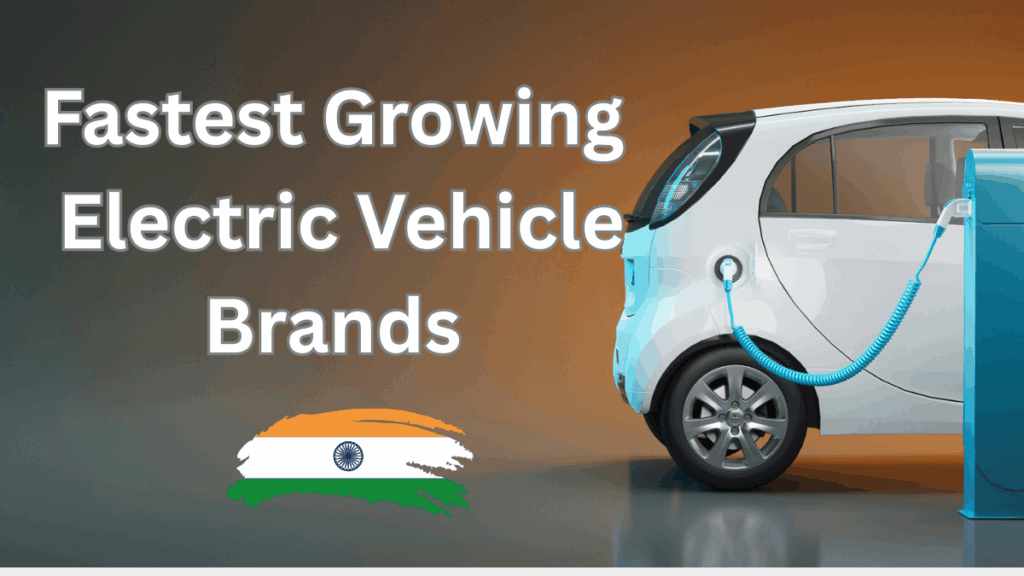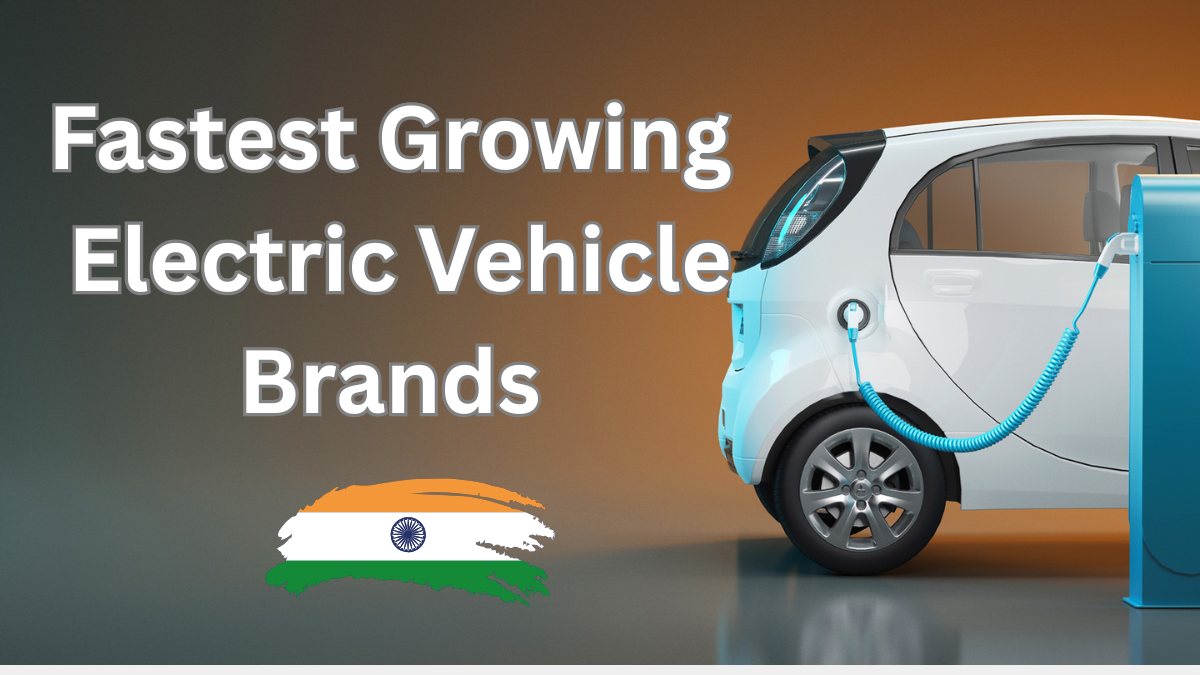The Indian electric vehicle (EV) market is undergoing a significant transformation as demand for sustainable transportation solutions continues to surge. With the government’s push for green energy and a growing number of environmentally-conscious consumers, 2025 is set to be an exciting year for electric vehicle brands. Here, we take a closer look at the fastest growing EV brands in India and the top electric vehicle companies shaping the future of transportation in the country.

Table of Contents
Key Trends in the EV Market in India

India is fast emerging as one of the largest markets for electric vehicles. The country’s EV adoption has been driven by several factors:
-
Government Initiatives: Incentives like the Faster Adoption and Manufacturing of Hybrid and Electric Vehicles (FAME) scheme.
-
Environmental Awareness: Growing concerns about air pollution and carbon emissions.
-
Technological Advancements: Improved battery life and charging infrastructure.
These trends have contributed to the rise of EV startups in India, with several brands making their mark in the competitive EV landscape.
Top Electric Vehicle Companies in India
India’s EV sector is a diverse ecosystem, with well-established players and exciting new startups entering the market. Here are some of the fastest growing EV brands in India 2025:
1. Tata Motors
Tata Motors is leading the electric revolution in India with its popular EV models like the Tata Nexon EV and Tata Tigor EV. The company has been recognized for its affordability, range, and performance, making it a favorite among Indian consumers.
-
Key Models: Nexon EV, Tigor EV
-
Range: 250–312 km per charge
-
Price Range: ₹14-18 lakhs
2. Mahindra Electric
Mahindra Electric has long been a pioneer in the Indian EV market. Known for models like the Mahindra e2o Plus and Mahindra XUV400, the brand is rapidly expanding its presence across urban and rural markets.
-
Key Models: e2o Plus, XUV400
-
Range: 140–450 km per charge
-
Price Range: ₹8-22 lakhs
3. Ather Energy
Ather Energy, an EV startup in India, has made waves with its stylish electric scooters like the Ather 450X. The company is known for its innovative features and premium design.
-
Key Models: Ather 450X, Ather 450 Plus
-
Range: 70–116 km per charge
-
Price Range: ₹1.15-1.50 lakhs
4. Ola Electric
Ola Electric has emerged as one of the fastest-growing EV brands in India in 2025. With its electric scooter, the Ola S1, the company is targeting urban commuters looking for an affordable and efficient mode of transportation.
-
Key Models: Ola S1, Ola S1 Pro
-
Range: 141–181 km per charge
-
Price Range: ₹1–1.50 lakhs
5. BYD India
BYD (Build Your Dreams) has become a dominant force in India’s EV sector, particularly with its electric buses and the recent launch of the BYD e6 electric MPV. The brand is gaining popularity due to its focus on performance and energy efficiency.
-
Key Models: BYD e6, BYD Atto 3
-
Range: 300–400 km per charge
-
Price Range: ₹30-40 lakhs
6. XPeng Motors
XPeng Motors, an international EV startup in India, has started making inroads in India with its futuristic electric vehicles. Their models stand out for their technology-driven features, such as autonomous driving capabilities.
-
Key Models: XPeng P7, XPeng G3
-
Range: 400–700 km per charge
-
Price Range: ₹25-35 lakhs
Why Are These EV Brands Growing So Fast?
Several factors contribute to the rapid growth of these top electric vehicle companies in India:
-
Government Incentives: Tax exemptions and subsidies are helping make EVs more affordable.
-
Growing Charging Infrastructure: Increased installation of EV chargers across cities.
-
Consumer Awareness: More consumers are opting for EVs to reduce their carbon footprint and save on fuel costs.
The Future of EV Brands in India
As we move towards 2025, the Indian electric vehicle market is expected to see exponential growth. The focus will be on:
-
Battery Innovation: Advancements in battery technology for longer ranges and faster charging times.
-
Affordability: More budget-friendly electric vehicles for a wider demographic.
-
Sustainability: Increased emphasis on eco-friendly materials and energy-efficient manufacturing processes.
Vertical Table: EV Brands and Their Key Details
| Brand | Key Models | Range | Price Range |
|---|---|---|---|
| Tata Motors | Nexon EV, Tigor EV | 250–312 km | ₹14-18 lakhs |
| Mahindra Electric | e2o Plus, XUV400 | 140–450 km | ₹8-22 lakhs |
| Ather Energy | Ather 450X, Ather 450 Plus | 70–116 km | ₹1.15-1.50 lakhs |
| Ola Electric | Ola S1, Ola S1 Pro | 141–181 km | ₹1–1.50 lakhs |
| BYD India | BYD e6, BYD Atto 3 | 300–400 km | ₹30-40 lakhs |
| XPeng Motors | XPeng P7, XPeng G3 | 400–700 km | ₹25-35 lakhs |
FAQs
1. Which are the fastest growing EV brands in India in 2025?
-
The fastest growing EV brands in India in 2025 include Tata Motors, Mahindra Electric, Ather Energy, and Ola Electric. These companies have made significant strides with innovative products and aggressive marketing strategies.
2. What are some top electric vehicle companies in India?
-
Some of the top electric vehicle companies in India are Tata Motors, Mahindra Electric, Ather Energy, and BYD India. These brands are dominating the market with their range of electric cars and scooters.
3. How does Ola Electric compare to other EV brands?
-
Ola Electric stands out for its stylish scooters and advanced features like app-based controls and fast charging. Its price range is more affordable compared to some other brands, making it an attractive choice for urban commuters.
4. What is the future of electric vehicles in India?
-
The future of electric vehicles in India looks promising with rapid advancements in battery technology, increased government support, and a growing focus on sustainable mobility solutions. More affordable EV options and widespread charging infrastructure will also contribute to growth.
Click here to learn more







